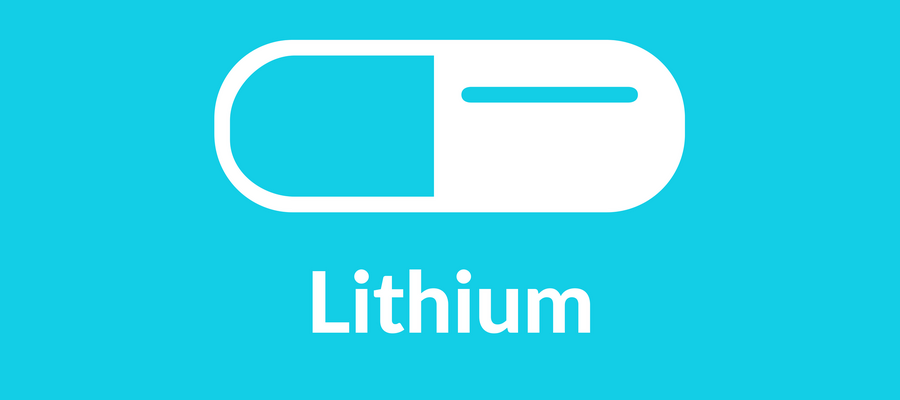
Does lithium help anxiety?
Lithium carbonate is commonly used to treat bipolar disorder and can be used to treat severe depression, too. In this article, we will look at the effect it has on mental health and whether it could play a role in our anxiety levels.
What is it?
Lithium is a metal. It is a naturally occurring element and can be found on the periodic table under the chemical symbol Li. It is the lightest natural metal.
You may have run into it during a high school science class. If you drop it into water, it fizzes steadily and becomes smaller, until it eventually disappears.
It has many uses in manufacturing including glass, ceramics, working with metal and nuclear power.
It is also used within the human body. In this article, I will be concentrating on the medicinal uses.
Does our body need it?
Yes, but it's not that important. There are no known diseases that you acquire from lack of lithium, for example. So, having low lithium levels does not seem to be immediately harmful.
However, it does seem to increase the risk of suicide, committing crimes and drug use. Therefore, it is likely that it has some effect on our brain chemistry.
What is it used for?
In a medicinal context, it is referred to as lithium salts, lithium carbonate or lithium compounds.
It is used to treat bipolar disorder1 and is typically prescribed for a long period (six months2, for example).
It may also be used to treat severe depression. However, it is only used after first-choice antidepressants, such as SSRIs, have failed to produce results.
If you are prescribed it, it may be under a brand name, of which there are many3.
"Calith, Camcolit, Carbolit, Carbolith, Ceglution, Duralith, Eskalith, Hypnorex, Lentolith, Licab, Licarb, Licarbium, Lidin, Lilipin, Lilitin, Limas, Liskonum, Lithan, Lithane, Litheum, Lithicarb, Lithionate, Lithizine, Lithobid, Lithocarb, Lithocap, Lithonate, Lithosun SR, Lithotabs, Lithuril, Litilent, Manialit, Maniprex, Phanate, Phasal, Plenur, Priadel, Quilonium-R, Quilonorm Retardtabletten, Teralithe, Theralite"
What does it do?
The primary benefit is that it reduces the risk of suicide.
It helps to stabilise your mood, reducing the swings. For bipolar, it may help to increase the "normal" period between the highs and lows.
How does it work?
We don't know, exactly4.
It seems to increase the levels of serotonin by triggering greater production. In this sense, it works along the same lines as SSRI antidepressants in increasing the amount of serotonin in the brain.
It also affects your levels of norepinephrine, similar to the way SSNI antidepressants do.
Given that both of these are commonly believed to have an affect on our mood, hence the regulating of them by antidepressant drugs, it seems plausible that lithium works similarly. However, there are several competing theories about how it exactly works.
It may also be that it helps to reduce mood by helping the body control its levels of dopamine and glutamate. If so, this should suggest that at least some of the benefit is limited to bipolar disorder, and not depression or anxiety.
Will it help with anxiety?
Maybe. The real problem with answering this question is that we just do not know yet.
There are theories about how it might work5. However, there is a lack of research to support whether it can reduce anxiety and improve mental health as a whole.
If part of your mental health issues are directly related to mood, then lithium could be an avenue to explore.
What are the side effects?
There are a lot, and they can be severe.
Very common side effects include constipation, diarrhoea, headaches, shaking, nausea, vomiting and weight gain. Acne and hair loss can also be common.
This is not an exhaustive list, so if you have been prescribed it, see the informational leaflet for a full list of side effects.
If you are taking lithium, you will need regular check-ups with your doctor. The dosage of lithium can run uncomfortably close to toxic levels, so it is important for your doctor to ensure your lithium level is correct.
You shouldn't take it while pregnant, and you should not take ibuprofen while taking it.
It may increase your risk of hypothyroidism and kidney damage. Finally, it also increases your risk of acute dehydration.
Conclusion
Lithium is a powerful treatment for bipolar disorder and stabilising our mood.
However, it is also a powerful substance and one that comes with a long list of side effects. Therefore, it should only be considered when other options have failed.
Related articles
Metadata
Published 4 September 2017. Written by Chris Worfolk.
References
-
Nolen WA. More robust evidence for the efficacy of lithium in the long-term treatment of bipolar disorder: should lithium (again) be recommended as the single preferred first-line treatment? International Journal of Bipolar Disorders. 2015;3:1. doi:10.1186/s40345-014-0017-6. ↩︎
-
Harry Croft. Lithium carbonate full prescribing information. Healthy Place. 7 April 2017. Link. ↩︎
-
Mental Health Daily. Lithium For Anxiety Disorders: An Unconventional, Underinvestigated Intervention. 15 September 2016. Link. ↩︎

